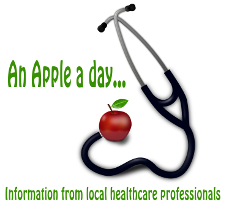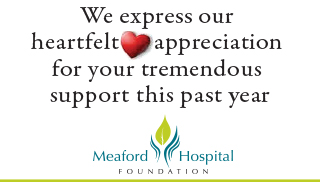By Elaine Burns
 If you missed our May 15 print edition, you missed this and other articles that don’t appear online. Be sure to pick up tomorrow’s print edition of The Meaford Independent for our summer BBQ tips special feature!
If you missed our May 15 print edition, you missed this and other articles that don’t appear online. Be sure to pick up tomorrow’s print edition of The Meaford Independent for our summer BBQ tips special feature!
As my grandmother was fond of saying, “An ounce of prevention is worth a pound of cure.” This is still very true today.
The confusing part is trying to figure out what we should be preventing, what is worth taking note of, and what is today’s fad. For example, we have for more than 30 years been told that fat is bad and a diet high in carbohydrates and low in fat will prevent, in particular, heart disease.
Recently, Time magazine published an apology for promoting this. It seems a low fat-high carb diet may be the underlying cause of obesity, deficiencies in Vitamins A, D, E, and K, as they require fat for the body to metabolize them, and may have totally no effect in lowering cholesterol. Does this mean we should all hang out at the local fast food joint? No, but it does bring into question how we can knowledgeably and effectively plan a healthy lifestyle, or more importantly what we should be trying to prevent.
According to the Grey Bruce Health Unit’s 2014 Healthy Communities Picture (this is a review of health and illness patterns and determinants within Grey and Bruce counties), these are the health issues plaguing this area:
-
obesity
-
above-average alcohol intake
-
cardiovascular disease, particularly Ischemic heart disease and strokes
-
diabetes
-
unintentional injuries, including falls and motor vehicle collisions
-
cancer, specifically colon cancers
We will be providing information on all of these issues, but in the meantime here are some preventions that may lessen your chances of developing these and other issues.
First, as mentioned in the inaugural column, you should have a health professional to help you through this maze. For most of you this will be your family doctor. However, some of you may choose to rely upon a nurse practitioner, or a doctor of naturopathy.
These healthcare providers will need to seeyou. Sounds obvious, doesn’t it. You’d be surprised.
Blood work for both a base line or ongoing value needs to be completed. The most common tests include haemoglobin to see if you have enough red cells to carry oxygen to your cells and electrolytes, commonly shortened to ‘lytes’, which gives a good picture of the chemical balance of your body. A blood sugar test looks at the body’s ability to utilize sugars. Tests called ‘cardiac markers’ can signal heart problems.
A urinalysis can reflect the body’s ability to get rid of wastes, or sugars. This can be a valuable marker for kidney disease as well as diabetes.
A cardiogram (ECG) is a test of your heart’s electrical messaging. A base line for this is essential so that any future disturbances can be confirmed.
All of these tests provide your healthcare practitioner with the baseline or current condition of your body.
There are other tests that are recommended as screening for the identification and early treatment of possible future problems. These include:
-
Breast screening: Mammography screening for breast cancer can be ordered by your physician at any age, however if you are between the ages of 50-74 this can be organized by self-referral. There are many Ontario Breast Screening programs throughout the province. We are fortunate to have one in Owen Sound, housed in Grey Bruce Health Services: to make an appointment call 519-376-8637.
-
Colorectal Screening: Stool specimen for occult blood detects early signs which may indicate colon cancer. Cancer Care Ontario recommends that this test should be done annually. Occult blood means hidden blood, blood that is not visible to the naked eye. For those 50-74, again Cancer Care Ontario recommends a base line screening at age 50 for colon cancer (colonoscopy)and future tests for those with a close family history of colon cancer or those with a positive stool for Occult Blood Test.
-
Bone Density Study: Bonedensitometry, the official name for this, is recommended for postmenopausal women, as a base line. This test looks for osteoporosis, a disease that traditionally affects women and leads to fragile bones and the possibility of future fractures and degeneration in bone health. It is not widely publicized but men can be osteoporotic too. Any man with a history of frequent bone fractures would benefit from this. Here in Meaford we are fortunate to have a bone density machine in the Meaford hospital.
-
Cervical Cancer Screening: For women ages 21-69 screening for cervical cancer (pap smear) is recommended.
Other preventions that will help you live a healthier life include:
-
Immunization: No need to rehash the recent discussion on this for children. For adults too, it is important to keep your boosters up to date to prevent diptheria, pertussis (whooping cough), and tetanus. These should be renewed every ten years. Annual flu shots help, in most cases, to minimize this year’s strain of flu, but also helps prevent the spread of flu to others. Also, for those over 50 it is recommended to have an anti-pneumonia vaccination. This is of particular concern to those with ongoing breathing problems. To get the up-to-date information on immunization at all ages speak to your healthcare practitioner or through the Grey Bruce Health Unit’s website found at www.publichealthgreybruce.on.ca or by contacting them at 519-376-9420.
Immunization is also important for those travelling outside Canada.
-
Dental screening: The human mouth is filthy! Not only can a lack of dental hygiene contribute to bad breath but it is one of the leading causes of general ill health or infections. Never before have we kept our natural teeth in such numbers. This is good. However dental screening and daily maintenance will improve everyone’s health and smile. One of the issues in maintaining good dental care is the cost. For Grey Bruce residents under the age of 17 help can be provided by the Health Unit. Contact 519-376-9420 (press 8) for information and appointments.
-
Activity: Remember how they used to tell us that, “if you don’t use it you lose it”, again sage advice. Inactivity, for example, keeping to bed at home or in the hospital, leads to a 5% decline in muscle tone every day. For some of us we can regain this by increasing our activity once that period of inactivity has passed. For some, notably the elderly, this cannot be regained and general strength declines. So do what you can! There are exercise programs here in Meaford that are geared to those who have decreased mobility. Find something you like to do and do it. Thirty minutes of exercise three times a week is recommended. That 30 minutes does not need to be done all at once if you cannot tolerate that. In Grey Bruce 14% of teens indicate that they participate in no activity within or outside of school and spend more than four hours a day in front of screens (TV, video games, etc). For all ages, daily exercise, be it a walk or more, will greatly improve breathing, muscle tone, cardiac health and mental or emotional balance.
-
Judicious use of medication: This means over-the-counter (OTC) meds as well as prescribed. Natural does not always mean safe for you. Discuss with your healthcare practitioner and your pharmacist ALL meds you are taking. Make sure to discuss it before you start taking supplements on your own. Get your advice from a reliable source be it your doctor, pharmacist, naturopath, or a reputable website (this does not include Facebook referrals)
-
Review your dependence on smoking and alcohol consumption. While the rate of smokers has been decreasing province-wide we still have issues here including the exposure of children and adults to second- or third-hand smoke. Alcohol consumption remains high particularly for males. Heavy drinking is considered more than five drinks on any one occasion at least once a month. This may be the reason for our higher than average male population unintentional injury rate.
We are also seeing a 4% incidence of newborns exposed to significant alcohol during pregnancy. (GBHU 2006)
-
Healthy Eating: Particularly the intake of five or more fruits or vegetables a day. A balanced diet not dependent on packaged or prepared foods is recommended. The reduction in the intake of sugars from soft drinks and fruit drinks is advisable. Use of artificial sweeteners, particularly Aspartame, should be eliminated or greatly reduced. This requires meaningful shopping, label reading, and understanding. The Grey Bruce Health Unit provides classes in healthy shopping and healthy cooking.
The GBHS Diabetes Education Centres will also provide essential information on healthy eating and shopping.
Not all diseases are preventable but the severity could be reduced and the onset could be delayed with these preventions and you will feel better.
Take charge. It is your health!
Remember if you have a general question about health issues please send them to The Meaford Independent at elaine@themeafordindependent.ca











